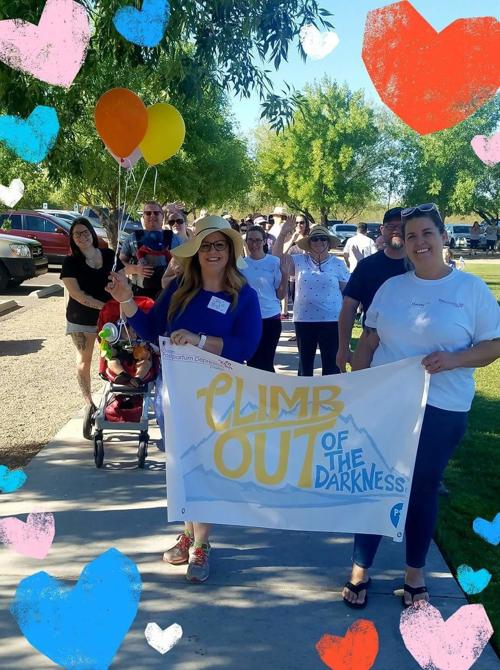A local nonprofit seeks to bring postpartum depression and anxiety out of the shadows with the Climb Out of the Darkness at 7:30 a.m. May 4, at Brandi Fenton Park.
“Perinatal mood disorders and anxiety are the leading complication of childbirth if measured against other physical risks like gestational diabetes and hypertension,” said Carole Sheehan, founder of the Tucson Postpartum Depression Coalition. “In the general population, 20 percent is the average prevalence of perinatal mood disorders.”
The organization is dedicated to outreach and education about maternal emotional health from conception through one year after childbirth.
It is working to promote awareness about the wide range of perinatal mood disorders, which include not only postpartum depression and anxiety but also lesser-known conditions such as postpartum panic disorder; perinatal obsessive-compulsive disorder; postpartum post-traumatic stress disorder due to birth trauma or past traumas; bipolar mood disorders; and more rarely, postpartum psychosis.
Coalition services include programs and support groups for expectant and new mothers and their families as well as a quarterly informational meetings that are free and open to the public. Sheehan said the coalition also provides low-cost training for law enforcement and legal experts, primary health care providers and providers in underserved areas where the incidence of perinatal mood disorders are often well above average.
“In Southern Arizona we have pockets where the prevalence is higher: We have lots of people coming from other places to try to make a life, so they might be isolated or alone with no support system in place. There is a lot of single motherhood as well, and these risk factors all raise the prevalence for perinatal mood disorders,” she said.
Sheehan is particularly excited about the coalition’s newest effort, which seeks to fund a group of trained peer mentors who offer free assistance to those experiencing perinatal mood disorders and anxiety. She said the mentors will take the support offered by the coalition’s Warm Line, which is available from 9 a.m. to 8 p.m. seven days a week at 1-888-434-MOMS or 1-888-434-6667 a step further.
“The Warm Line is great for mom’s in crisis at the moment, but this offers something in addition to just connecting for one time on the phone. It is geared toward offering a supportive relationship with personal access — perhaps through texting and talking and meeting up for a cup of coffee or to attend support groups. It gives a mom who is alone someone to count on until she is strong again and can make her own way,” said Sheehan.
The coalition wants to ensure that no mother falls through the cracks, Sheehan said.
“We are trying to make sure than mental illness for moms is well understood and something that people recognize as a public health issue. We all need to band together and follow mental health issues; if they are left untreated they cause further problems, not only for the mom, but for children and subsequent generations,” she said.





